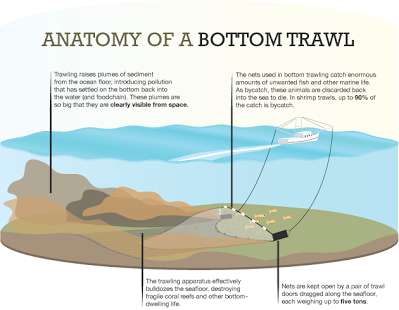Why in news?
- Sri Lanka recently passed amendments to Fisheries and Aquatic Resources Act.
- It banned the fishing practice of bottom-trawling in their waters
What is Bottom-trawling?
- It is a fishing practice, which involves trawlers dragging weighted nets along the sea floor.
- It is known to cause great depletion of fishery resources.

Why it is a source of conflict?
- Ever since Sri Lanka’s civil war ended in 2009, fishermen of Sri Lanka’s Tamil-majority north have been trying to start fishing.
- For decades, they had been denied access to the sea by the armed forces and the LTTE.
- They began rebuilding their lives with very limited resources and huge loans.
- They are confronting the challenge of bottom-trawlers, originating from Tamil Nadu and trespassing into their waters.
- Sri Lankan fishermen want an immediate end to incursions by Indian trawlers, and those from Tamil Nadu insist on a three-year phase-out period.
What measures taken by Sri Lanka?
- Sri Lanka recently banned the destructive fishing practice of bottom-trawling in their waters, making violators liable for a fine of LKR 50,000 (approximately Rs. 20,000) and face two years imprisonment.
- It was made by amending the country’s Fisheries and Aquatic Resources Act.
- The amendment is aimed at curbing local trawlers as well as deterring trawlers from Tamil Nadu.
What are the impacts?
- The development could directly impact a section of fishermen from Tamil Nadu, who engage in bottom-trawling.
- They have often been found trespassing into Sri Lanka’s territorial waters.
- It also sparked resistance from a small section of northern Sri Lankan fisher folk who had also begun using trawlers to maximise profits.
- If this practice continues to gain ground even among local fishermen, the long-term consequences on fishing resources in the contested Palk Bay region will be irremediable.
What the Indian government proposes?
- The Central and State governments plan to provide 500 deep sea fishing boats with long lines and gill nets this year, as part of a plan to replace 2,000 trawlers in three years.
- A Joint Working Group set up by both countries last year is in place.
What is the way ahead?
- Ultimately, the solution lies in the transition from trawling to deep sea fishing.
- Ultimately, the solution lies in the transition from trawling to deep sea fishing.
- An appropriate response from Tamil Nadu would be to expedite the conversion of its trawlers to deep sea fishing vessels, and not merely condemn Sri Lanka.
- Besides the fisheries conflict, they need to discuss marine conservation, thus giving equal importance to protecting livelihoods and sustainable fishing.
Source: The Hindu

